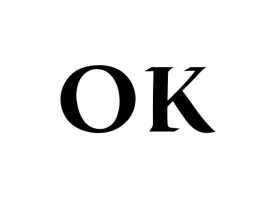共找到12條詞條名為OK的結果 展開
OK
詞語OK
OK是一徠個非正式的口語化的詞。意思是:好的,可以接受的。也可以表示贊同,同意。OK又可以寫成okay或者O.K.,發音一樣。它也是世界知名度最高的一個英文單詞。

ok
美國人對某件事表示贊同或認可時,常說ok,意思是"好","行","不錯".這個用語,最初是美國鐵路扳道工人的用語。
他們當班時,如果鐵路上一切正常,就說聲All correct,即"完全正常"。由於All音接近"O",correct音近"K",為了方便,工人們就省讀"OK"來表示同樣的意思。後來,詞義不斷演變,現在不但表示"好","行","不錯"這些意思,還包含有對別人的意見表示贊同,承認的意義。在簽名中也用於表示同意,認可。
值得提出的是,中國改革開放以來,OK一詞十分流行,成了時尚用語。但由於用得太濫,以至出現不少誤用現象。例如:
美國同事高呼OK,向這位33歲的中國科學家表示祝賀。(《中華兒女》1992年第5期)
斯束負爾先生蹲在地上看著中國螞蟻如此悲壯的舉動,像觀看一場世界級的足球比賽,嘴裡不停地驚嘆著:“OK! OK!”(《當代》1991年第1期)
上面第一句的“OK”應改為“Congratulations”;第二句的“OK”應改為“Oh”或“God”。
甚至還出現超出漢語規範的亂用。例如:
評選的結果是李大鵬寫的“西安喜來登大酒店”最“OK”。(《中華兒女》1991年第3期)
我所認識的邱昶,是熱情、忙碌、笑意盎然且很能OK的年輕人。(《羊城晚報》1994年7月24日)
上面第一句的“OK”應改為漢字“好”;第二句的“OK”應改為為漢字“干”。
周海中教授在1995年發表的《關於“OK”》一文中認為,這種亂用“OK”的現象應該引起語言學界乃至全社會的高度重視。他在文中建議,中文報刊圖書中,最好將“OK”的含義用漢字書寫;如果喜歡使用“OK”以顯洋氣時,應持慎重態度,做到正確、規範,以免出洋相。
OK
adj.
![OK[詞語OK]](https://i1.twwiki.net/cover/w200/m3/9/m393f8a09a7543778a4448506a3e7f552.jpg)
OK[詞語OK]
Ok
[EJ5keI]
adj.
好,對,行
adv.
好,對,可以
n.
同意
OK
OK 1或 O.K. 或 o.kay
AHD:[½-k³;“] 【非正式用語】
D.J.[*&6ke!]
K.K.[o6ke]
n.(名詞)
【複數】 OK's 或 O.K.'s 或 o.kays
Approval; agreement:
認可;同意:
got her supervisor's OK before taking a day off.
事先徵得了管理人員的同意准假一天
動詞)
OK'd 或 O.K.'d 或 o.kayed OK'ing 或 O.K.'ing 或 o.kay.ing OK's 或 O.K.'s 或 o.kays
To approve of or agree to; authorize.
贊成或同意;批准
interj.(感嘆詞)
Used to express approval or agreement.
行:用以表達准許或同意之意
Abbreviation of oll korrect
oll korrect的縮寫
slang respelling of all correct
all correct的俚語重新拼寫
OK
adv.(副詞)
adj.(形容詞)
Although we use this word hundreds of times a week whether things are OK or not,we have probably rarely wondered about its history.That history is in fact a brief one,the word being first recorded in 1839,though it was no doubt in circulation before then.Much scholarship has been expended on the origins ofOK,but Allen Walker Read has conclusively proved thatOK is based on a sort of joke. Someone pronounced the phraseall correct as oll (or orl ) correct,and the same person or someone else spelled itoll korrect,which abbreviated gives usOK. This term gained wide currency by being used as a political slogan by the 1840 Democratic candidate Martin Van Buren,who was nicknamedOld Kinderhook because he was born in Kinderhook,of the same year,referring to the receipt of a pin with the sloganO.K.,had this comment: “frightful letters . . . significant of the birth-place of Martin Van Buren,old Kinderhook,as also the rallying word of the Democracy of the late election,‘all correct’ . . . Those who wear them should bear in mind that it will require their most strenuous exertions . . . to make all things O.K.”
雖然我們一星期都要使用這個詞達上百次來表示事情狀況的行或不行,但我們可能很少有人去探究這個詞的歷史。但艾倫·沃克·里德最終證實OK 是出自一個什麼笑話。有人把all correct 這個片語發音成、這一名詞術語被1840年的民主黨總統候選人馬丁·凡·布倫作為政治宣傳口號而得到廣泛運用。馬丁的綽號是老金德胡克,因為他出生於紐約州的金德胡克。
OK
OK 2
abbr.(略語)
Oklahoma.
Oklahoma.
ok
Important derivatives are: eye,daisy,window,eyelet,ocular,inoculate,monocle,myopia,autopsy,synopsis,optic,optometry
重要派生詞為:eye,daisy,window,eyelet,ocular,inoculate,monocle,myopia,autopsy,synopsis,optic,optometry
To see.
看見,了解,觀察,辨別.
eye ; daisy,from Old English ¶e,eye;
eye ; daisy,源自 古英語 ¶e,眼睛;
walleyed,window,from Old Norse auga,eye;
walleyed,window,源自 古斯堪的納維亞語 auga,眼睛,視覺;
ogle,from Low German oog,oge,eye. a,b,and c all from Germanic *aug½- (with taboo deformation).
ogle,源自 低地德語 oog,oge,眼睛. a,b,和 c 都源自 日耳曼語 *aug½- (和破壞禁忌).
Suffixed form*ok w-olo- .
添加後綴的形式*ok w-olo- .
eyelet,ocellus,ocular,oculist,ullage ; inoculate,monocle,oculomotor,pinochle,from Latin oculus,eye;
eyelet,ocellus,ocular,oculist,ullage ; inoculate,monocle,oculomotor,pinochle,源自 拉丁語 oculus,眼睛;
inveigle,from French aveugle,blind,from Gallo-Latin compound *ab-oculus,blind,modeled on Gaulish ex-ops,blind.
inveigle,源自 法語 aveugle,盲人,源自 法國拉丁語 複合詞 *ab-oculus,盲目的,模仿 高盧語ex-ops,瞎的.
Form*ok w-s . metopic,myopia,nyctalopia,Pelops,phlogopite,pyrope,triceratops,from Greek ½s,eye (and stem *op-,to see).
形式*ok w-s . metopic,myopia,nyctalopia,Pelops,phlogopite,pyrope,triceratops,源自 希臘語 ½s,眼睛(和字干 *op-,看見).
Suffixed form*ok w-ti- . ( opsin ),-opsis,-opsy ; autopsy,( iodopsin ),( rhodopsin ),synopsis,from Greek opsis,sight,appearance.
添加後綴的形式*ok w-ti- . ( opsin ),-opsis,-opsy ; autopsy,( iodopsin ),( rhodopsin ),synopsis,源自 希臘語 opsis,景觀,外表.
Suffixed form*ok w-to- . optic ; diopter,optometry,panoptic,from Greek optos,seen,visible.
添加後綴的形式*ok w-to- . optic ; diopter,optometry,panoptic,源自 希臘語 optos,看到,看得見的.
Suffixed form*ok w-³ . metope,from Greek op¶},opening.
添加後綴的形式*ok w-³ . metope,源自 希臘語 op¶},開口.
Suffixed form*ok w-mö . ommatidium,ommatophore,from Greek omma (N *opma ),eye.
添加後綴的形式*ok w-mö . ommatidium,ommatophore,源自 希臘語 omma (N *opma ),眼睛.
Suffixed form*ok w-tro- . catoptric,from Greek katoptron,“back-looker,” mirror ( kata-,down,back; see kat- ).
添加後綴的形式*ok w-tro- . catoptric,源自 希臘語 katoptron,“可以看後背的物體,”鏡子 ( kata-,向下的,向後的;參見 kat-).
ophthalmo- ; exophthalmos,from Greek ophthalmos,eye (with taboo deformation).
ophthalmo- ; exophthalmos,源自 希臘語 ophthalmos,注意(不再注意禁忌).
Zero-grade form*…k w- (of oldest full-grade form *…k w- ).
零級形式*…k w- ( *…k w- 的最古老的全級形式).
(seeant- ) Latin antºs,“appearing before,having prior aspect,” former ( *anti-,before);
(參見ant-) 拉丁語 antºs,“在…之前出現,有較早的因素,”從前的,前者的 *anti-,在…之前;
(see³ter- ) Latin á½x},“black-looking,” frightful ( *atro-,black);
(參見³ter-) 拉丁語 á½x},“面色陰沉的,”可怕的( *atro-,暗淡的);
(seeghwer- ) fer½x,“wild-looking,” fierce ( *ghwero-,wild).
(參見ghwer-) fer½x,“面相野蠻的,”兇殘的 ( *ghwero-,野蠻的).
Pokornyok ø}- 775.
波科爾尼ok ø}- 775.
OK
OK 1or O.K. or o.kay
AHD:[½-k³;“] Informal
D.J.[*&6ke!]
K.K.[o6ke]
n.
pl. OK's or O.K.'s or o.kays
Approval; agreement:
got her supervisor's OK before taking a day off.
OK'd or O.K.'d or o.kayed OK'ing or O.K.'ing or o.kay.ing OK's or O.K.'s or o.kays
To approve of or agree to; authorize.
interj.
Used to express approval or agreement.
Abbreviation of oll korrect
slang respelling of all correct
OK
adv.
adj.
Although we use this word hundreds of times a week whether things are OK or not,we have probably rarely wondered about its history.That history is in fact a brief one,the word being first recorded in 1839,though it was no doubt in circulation before then.Much scholarship has been expended on the origins ofOK,but Allen Walker Read has conclusively proved thatOK is based on a sort of joke. Someone pronounced the phraseall correct as oll (or orl ) correct,and the same person or someone else spelled itoll korrect,which abbreviated gives usOK. This term gained wide currency by being used as a political slogan by the 1840 Democratic candidate Martin Van Buren,who was nicknamedOld Kinderhook because he was born in Kinderhook,New editorial of the same year,referring to the receipt of a pin with the sloganO.K.,had this comment: “frightful letters . . . significant of the birth-place of Martin Van Buren,old Kinderhook,as also the rallying word of the Democracy of the late election,‘all correct’ . . . Those who wear them should bear in mind that it will require their most strenuous exertions . . . to make all things O.K.”
OK
OK 2
abbr.
Oklahoma.
ok
Important derivatives are: eye,daisy,window,eyelet,ocular,inoculate,monocle,myopia,autopsy,synopsis,optic,optometry
To see.
eye ; daisy,from Old English ¶e,eye;
walleyed,window,from Old Norse auga,eye;
ogle,from Low German oog,oge,eye. a,b,and c all from Germanic *aug½- (with taboo deformation).
Suffixed form*ok w-olo- .
eyelet,ocellus,ocular,oculist,ullage ; inoculate,monocle,oculomotor,pinochle,from Latin oculus,eye;
inveigle,from French aveugle,blind,from Gallo-Latin compound *ab-oculus,blind,modeled on Gaulish ex-ops,blind.
Form*ok w-s . metopic,myopia,nyctalopia,Pelops,phlogopite,pyrope,triceratops,from Greek ½s,eye (and stem *op-,to see).
Suffixed form*ok w-ti- . ( opsin ),-opsis,-opsy ; autopsy,( iodopsin ),( rhodopsin ),synopsis,from Greek opsis,sight,appearance.
Suffixed form*ok w-to- . optic ; diopter,optometry,panoptic,from Greek optos,seen,visible.
Suffixed form*ok w-³ . metope,from Greek op¶},opening.
Suffixed form*ok w-mö . ommatidium,ommatophore,from Greek omma (N *opma ),eye.
Suffixed form*ok w-tro- . catoptric,from Greek katoptron,“back-looker,” mirror ( kata-,down,back; see kat- ).
徠ophthalmo- ; exophthalmos,from Greek ophthalmos,eye (with taboo deformation).
Zero-grade form*…k w- (of oldest full-grade form *…k w- ).
(seeant- ) Latin antºs,“appearing before,having prior aspect,” former ( *anti-,before);
(see³ter- ) Latin á½x},“black-looking,” frightful ( *atro-,black);
(seeghwer- ) fer½x,“wild-looking,” fierce ( *ghwero-,wild).
Pokornyok ø}- 775.
